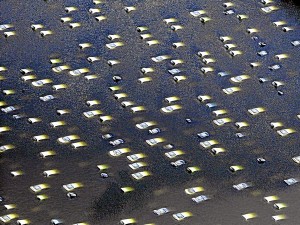Local parts makers seen to benefit from Thai problems

IN this Oct. 16, 2011, file photo, vehicles at a Honda car factory are submerged in floodwaters in the Rojana industrial district in Ayutthaya province, central Thailand. AP
The automotive industry in Thailand has been badly affected by some of the worst flooding the country has ever experienced. Some manufacturers, though, suffered more than others, such as Honda and the Technopark Rojana Industrial Estate, which is home to auto parts makers that supply many carmakers in Asia.
Frost and Sullivan analysts say that nearly 10 percent of auto parts for local production come from regions affected by the floods, thus disturbing the supply chain structure. Ayutthaya and Pathum Thani provinces account for around 40 auto parts manufacturers supplying most assembly plants in Thailand including Toyota, Auto Alliance Thailand (Ford and Mazda), Mitsubishi Motors and Nissan. The least affected automobile manufacturer in Thailand, so far, has been General Motors.
Last week, Honda Cars Philippines Inc. issued a statement saying it had temporarily suspended production at its Sta. Rosa, Laguna, plant due to limited parts supply caused by the flooding in Thailand. Toyota Motor Philippines also declared adjustments in production numbers this month for the same reason.
Philippine car parts makers recently revealed that car manufacturers had been surveying local car parts suppliers as early as mid-September. Ferdie Raquelsantos, external vice president of the Motor Vehicle Parts Manufacturers Association of the Philippines, disclosed that Japanese and American brands had been making the rounds among MVPMAP members.
Sources from the car manufacturing sector said, however, that they were not aware of such activities.
MVPMAP has 106 member companies that make auto parts, ranging from transmission assemblies and its component parts to wire harnesses, plastic and metal parts, trims, carpets, glasses, seat assemblies, pedals, under chassis components, bolts and nuts, webbing seatbelts, carriage seats and seat component parts.
Raquelsantos said over the phone that Philippine car parts makers could regain businesses lost to Thailand.
“At this point, anything is possible. The hub, more than anything, has to provide cost and consistency advantage over other locations. If the Philippines is to be considered (as an alternative to Thailand), it has to create strong propositions in these areas,” said a top executive of a Japanese automobile brand, who spoke on condition of anonymity.
Another representative of another Japanese car brand explained that should the manufacturer decide to source its parts in the Philippines, it would only be temporary. Thailand, he said, would still be the primary choice because Thai parts makers process their own raw materials and make parts from scratch.
“Having the Philippines as a secondary hub will not be easy, (as it) would require millions of dollars in setting up. And no one wants to invest on a country with ever-changing rates of incentives for businesses and lack of government support,” he stressed.
And besides, the representative added, there are other parts suppliers being eyed in Malaysia and Indonesia.
Previous analyses from experts showed that Thailand had become a major automotive manufacturing center due to government incentives, tax breaks and land-acquisition deals specifically designed to lure automotive companies and manufacturers.
A Filipino businessman who recently attended an Asian business conference expressed his doubts over the possibility that auto manufacturers in Thailand would look in the direction of the Philippines. “I think they were thinking of tapping Indonesia, Vietnam, India or Malaysia. I asked them why not the Philippines. They couldn’t pinpoint one underlying issue,” shared the businessman.
Supply status
Meanwhile, some auto manufacturers in the Philippines have released statements pertaining to the Thailand situation.
“As per the latest information received, General Motors operations in Thailand is addressing the matter, and so far contained the effect of the floods, and that for the requirements for the Philippines, we do not yet expect any major disturbance as far as the supply of our current units and availability of parts (are concerned),” said Albert Arcilla, The Covenant Car Company (Chevrolet Philippines) chief operating officer and managing director.
Nissan Motor Philippines Inc. public relations head Karla Tecson told Inquirer that NMPI still has enough inventory of parts. “We don’t import CBUs in Thailand. Generally, we are slightly affected but not as bad as the other manufacturers.”
Bloomberg Businessweek reported Saturday that Toyota, Asia’s biggest carmaker, is scaling back output in Japan for a third week and suspended overtime in North America for a second week as disruptions from the floods spread. It added that Honda is temporarily eliminating overtime and running North American plants at half capacity until next week as Japan’s third-largest automaker assesses its inventory. The article also quoted Todd Nissen, a spokesman for Ford Motor Company, that the US automaker told suppliers it will resume car assembly at its Auto Alliance Thailand factory on Nov. 14 after flooding disrupted production.














